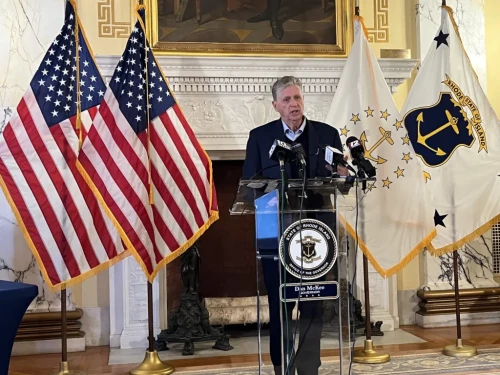On a recent afternoon at a West Roxbury gym, Brendan Bartczak was doing farmer’s walks — walking back and forth with a 20-pound dumbbell in each hand. Next up, his trainer Nanea Kay counted as he did squats.
People are lifting weights and doing bench presses nearby. For a gym, it’s notably quiet. There is no loud music or TV screens.
Inclusive Fitness was specifically designed for people who are neurodivergent and who have intellectual disabilities. While there are some gyms and organizations that offer fitness and recreation programs for neurodivergent clients, very few have been designed with those needs in mind from the ground up.
It’s sensory friendly. The lights can be dimmed for anyone with light sensitivity. The windows have light film to decrease distractions. Even the paint color was carefully chosen: light and dark blues.
Greg Austin founded Inclusive Fitness with his wife Kristina in 2020. They wanted a place for their son, Lucas, who has autism — and people like him — to work out and get high-quality strength and conditioning training.
“We could not find really anything that met our needs that had the same level of consistency, the same level of quality and the same results ... [we] knew that Lucas would benefit from,” he said.
According to a study from Preventive Medicine Reports, only about 9% of adults with intellectual disabilities get the minimum recommendations for physical activity, which puts them at a higher risk for health challenges. Barriers can include lack of physical accessibility in gyms, transportation challenges, sensory issues and high costs of fitness programs.
The business operates on a traditional for-profit business plan. Austin points to big names in fitness like SoulCycle and Orangetheory as models. They plan to open a second location in Burlington, Mass., next month — and hope to make it a national chain some day. About 200 athletes train at Inclusive Fitness, ages 12 and up.
The Austins came up with the idea while they were getting their MBAs at Babson College. They realized that, by starting this gym as a business instead of a nonprofit, they would be able to offer a better product and coaching — which is what they say their clients deserve.
Many recreational programs for people with disabilities focus on the social and environmental benefits of physical activity, rather than fitness as the core goal, Austin said. Therapists, counselors and teachers often overlook the need for fitness.
“This is a market,” Austin said. “Just people don’t look at it as a market, and that’s a mistake.”
Training at the gym is tailored to each individual after an in-depth assessment. The focus is on strength training that will help people in their everyday lives: Squats, burpees, forward hops, deadlifts, throwing a medicine ball.
“We expect our coaches to push our athletes, but in a way that works for them,” he said. “This is no joke. We work hard here.”
Across the gym, Ian Pfeffer was working with his coach on band pulldowns and bench presses. Pfeffer has been coming to Inclusive Fitness for two years. Pfeffer said he has gotten “stronger” since coming to the gym — his coach Matt Davis agrees.
Davis says coaching at Inclusive Fitness really isn’t much different from other gyms.
“A lot of the exercises and movements are actually very similar to what you might see in a neurotypical gym, where we’re focusing on really fundamental strength exercises that use multiple muscle groups — things like squats, things like deadlifts, farmer’s walks,” he said.
Sharon was there with her son, and asked GBH News not to share their last names for their family’s privacy. She said that coming to the gym has been “life-changing” for him.
“His confidence has grown. He’s gotten so much stronger,” she said.
Without the gym, it was hard to find a place where he fit in, even at school.
“For me, dignity is a big part of it because this looks like a nice workout center, you know, and there are so many things that our kids are excluded from. So this is a place where he feels like he’s doing what other kids are doing,” she said.







